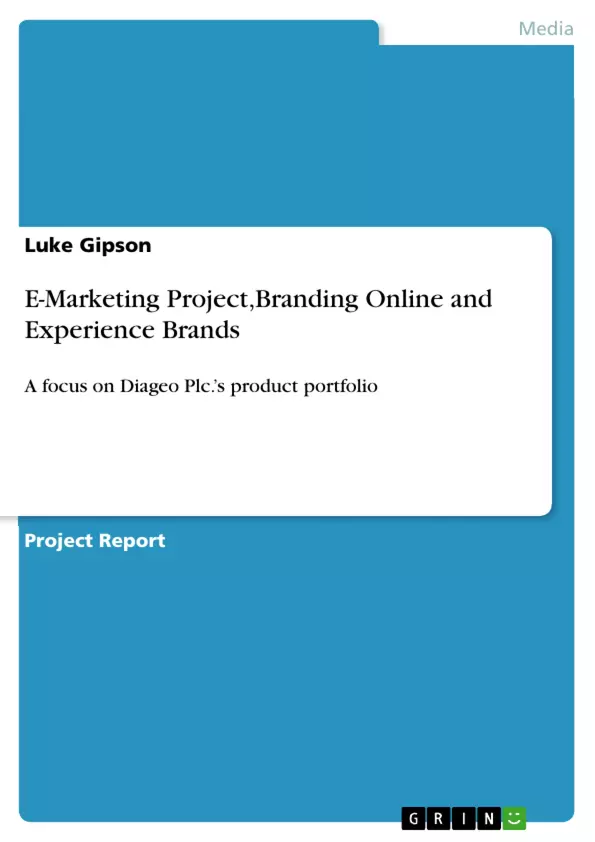Branding is a fundamental aspect to any business; its ability to influence and create loyalty is a vital tool which requires constant attention and extensive resources. In 2005 The Economist published a special report titled “Consumer power – Crowned at Last” (Economist, 2005) which outlined the key transition of a power shift, from producer or provider to the consumer and customer. This is a common theme which shall be explored in order to understand how brands have adapted to this transition, but with a particular focus upon how brands have been applied online and digitally. In order to establish an in depth analysis of this subject area there will be a focus upon experience brands within the alcoholic beverage industry. Diageo Plc is the third largest alcoholic company in the world (Week, 2010); and will be the company that is the focus of this evaluation. Further emphasis will consider how brands associated with tangible consumption and experiences can use this new age of branding to maximise customer loyalty but also remain competitive and manage various external threats.
Layout: Before considering experience branding within the product portfolio of Diageo the two variables will be explained and described with the use of academic theories; various contemporary opinions and examples. This breakdown will allow the impact that branding has upon the products that Diageo sells to be analysed critically. Section 3 will outline Diageo and its main business practices and operations, with a strong focus upon its core products and its key branding strategies. Following on from this Section 4 will provide a general outline of branding and the important concepts that are required to understand how experience branding functions; for example the price differences in private labels brands and manufacture brands. Section 5 will focus on how branding has changed and developed over time, outlining the key factors that had caused this and how it has affected overall business strategy and branding. Section 6 will develop upon the points made within the previous section and apply them in more depth with a focus upon online branding. The primary focus will be on how online business and branding has enhanced the power shift between organisations and consumers. Also the options for online branding will be explored and applied to Diageo’s business strategy in relation to experience branding.
Inhaltsverzeichnis (Table of Contents)
- Introduction
- Layout
- Brief History of Diageo
- Brands
Zielsetzung und Themenschwerpunkte (Objectives and Key Themes)
This paper examines the importance of branding, particularly experience branding, in the digital age, focusing on Diageo Plc., a global alcoholic beverage leader. The analysis aims to understand how brands have adapted to the power shift from producer to consumer, exploring the use of online branding and its impact on customer loyalty and competitive advantage.
- The evolution of branding and its influence on business strategy
- The impact of online branding on consumer relationships and brand equity
- The challenges and threats associated with online branding for experience brands
- The application of experience branding principles to Diageo's product portfolio
- The importance of brand equity and its measurement in the online environment
Zusammenfassung der Kapitel (Chapter Summaries)
- The introduction highlights the significance of branding in today's consumer-driven market, focusing on the transition from provider to consumer power. It establishes Diageo Plc. as the central case study, emphasizing its experience brands and their adaptation to online branding.
- The “Layout” section outlines the structure and content of the paper, providing a roadmap for the analysis. It emphasizes the use of academic theories, contemporary perspectives, and real-world examples to understand the impact of branding on Diageo's products.
- The "Brief History of Diageo" section provides a brief overview of the company's history and its global market position as a leader in the alcoholic beverage industry. It highlights Diageo's significant portfolio of premium brands, including popular examples like Smirnoff, Johnnie Walker, Baileys, and Guinness.
- The “Brands” chapter delves into the core concepts of branding, explaining the components of a brand and its role in marketing strategies. It distinguishes between private label brands and manufacturer brands, illustrating the differences through examples like Sainsbury's and Smirnoff. The section also discusses the concept of brand equity and its importance for both short-term and long-term business success.
Schlüsselwörter (Keywords)
This work explores the dynamic landscape of online branding and its implications for experience brands, particularly within the context of the alcoholic beverage industry. Key concepts include experience branding, brand equity, online branding, consumer relationships, and Diageo Plc.'s product portfolio. This study aims to provide insights into the successful adaptation of traditional branding principles to the digital age, addressing the evolving power dynamics between organizations and consumers.
How has branding changed in the digital age?
There has been a power shift from producers to consumers. Brands must now focus on digital experiences and online engagement to maintain loyalty.
What are "experience brands"?
Experience brands, like those in Diageo's portfolio (e.g., Guinness, Smirnoff), focus on the tangible consumption and the lifestyle experience associated with the product.
What is brand equity?
Brand equity refers to the value premium a company generates from a product with a recognizable name as compared to a generic equivalent.
How does Diageo Plc. use online branding?
Diageo uses digital platforms to maximize customer loyalty, manage external threats, and remain competitive by creating immersive brand experiences online.
What is the difference between private labels and manufacturer brands?
Private labels (like Sainsbury’s) are owned by retailers, while manufacturer brands (like Smirnoff) are owned by the producer, often commanding higher prices due to brand equity.



